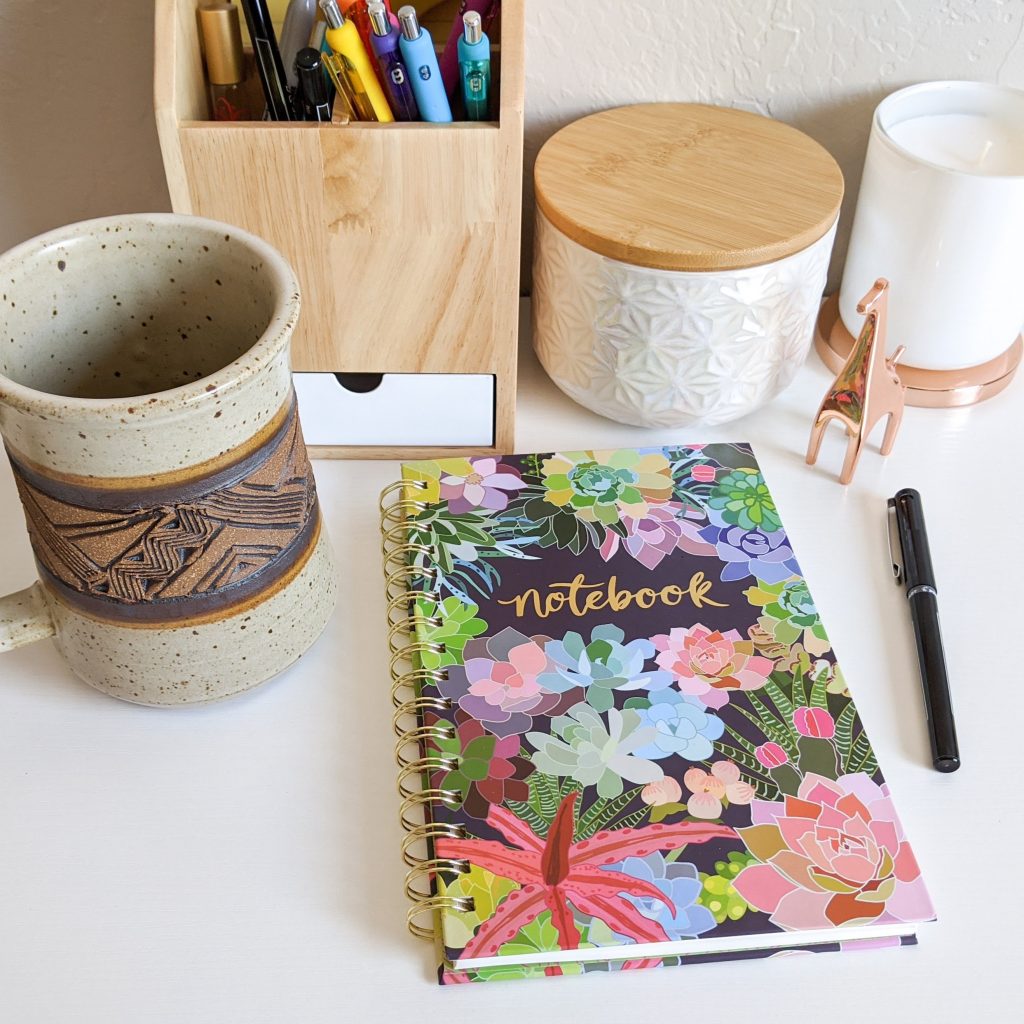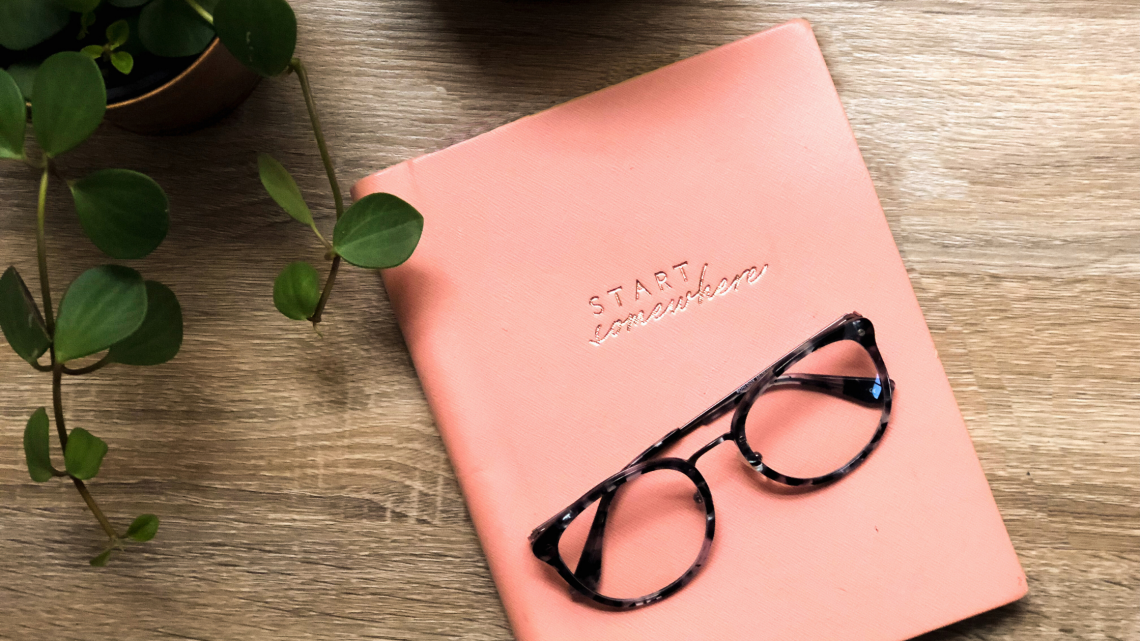This website uses affiliate links. I may earn a commission on purchases made at no extra cost to you.
There are two types of women: Those who want to start journaling and those who have been journaling their whole lives. Just kidding. I’m sure there are plenty of women who don’t care at all about journaling.
But since you’re here, I will assume that you fall into one of the aforementioned groups.
I don’t remember when I started journaling. There is a giant Rubbermaid storage tub in my bedroom closet containing multiple journals that date back to middle school. Maybe earlier.
I journaled consistently through high school–mostly about boys I liked and the injustice of having ultra-strict parents. There have been long periods where I did not journal at all and had to figure out how to start the habit again.
Whether you are a non-journaler who wants to give it a go or you’re trying to build the habit after a long time apart from pen and paper, I’ll teach you how to start journaling.
Why Should You Start Journaling?
“Journaling organizes your thoughts; allows you to see things in a concrete way that otherwise you might not see.”
— Kay WalkingStick
My number one reason for journaling is clarity. I don’t know what I think until I write it all down and can organize my thoughts to come to a conclusion.
Six months ago, deciding where to move, we drove a few hours to see a house on the border of Virginia and Tennessee. (Yes, those two states touch. I had to look at a map to confirm it.)
The house was the right price and rather tempting. But there were a lot of other factors to consider. My brain was a jumbled, stressed-out mess as I tried to decide what to do.
I took some time to journal about what I really wanted, plus the pros and cons of this particular house. In the back of my mind, I honestly assumed we would buy the house. After journaling, I could clearly see that it was not the right choice.
My other reason for journaling is to live more intentionally. I use a journaling method that allows me to examine my thoughts and choose to think thoughts that will serve me better. It’s life-changing.
You may also choose to start journaling to remember the events of your life. What feels so vivid as you’re living it can quickly fade from memory.
Remove Barriers to Start Journaling
To build a journaling habit, you’re going to need to let go of some perfectionist tendencies. If you think it should look or feel a certain way, you won’t stick with it long term.
Here are some ways to lower the bar / remove the barriers to entry:
- Your journal can be typed or written in a cute notebook or both! (Mine is.)
- While consistency is lovely, inconsistent journaling is better than no journaling.
- It’s ok for your writing to be mundane and repetitive and redundant and repetitive.
- Everything counts. One sentence. Five minutes. It counts.
- There is no right or wrong way to journal.
I have a super-cute spiral-bound journal that I write in on occasion. 95% of my journaling is done on my laptop in a Google Doc. Every year, I open up a fresh Google Doc and continually add journal entries with the date as the heading.
Yes, there are benefits to handwriting your journal entries. But when I’ve tried to do it, I journaled less or not at all. So I type.
I miss days or weeks of journaling all the time. It’s not a problem. I don’t worry about “catching up” by explaining everything that has happened since my last journal entry. That seems boring. I just start writing about whatever I feel like that day.
When you let it be imperfect and messy, you increase the chances that you’ll actually do it!

BTW, you can find my favorite journal HERE.
Journal Methods
My initial instinct with journaling is to keep things shallow: Today I went to the dentist. We had pizza for supper. I hope to someday own a golf cart. That kind of stuff. But I know that powerful writing comes when I force myself to go deeper. Two ways to go deeper are to set time or page guidelines for yourself.
Time
One journaling method is to set a timer and write continuously for the entire time. If you’re not sure what to write, you literally just write, I’m not sure what to write, I’m not sure what to write, until something comes to you.
It can be for just five minutes or much longer. (You might be surprised at what can come out in five minutes of focused journaling.)
The amount of time you choose can fluctuate based on how much time you have available.
Pages
Another method is to write until you fill a certain amount of pages. If you’re following the Morning Pages method from Julia Cameron’s The Artist’s Way, she recommends three pages of handwritten, stream-of-consciousness writing.
Lately, I’ve been doing my own version of Morning Pages: One full page of typed journaling first thing in the morning. I just keep typing until I fill the entire page.
One Sentence
One of the best ways to lower the bar on your journaling practice is to start a one-sentence journal. This is mostly a way to remember what’s happening in your life.
At the end of each day, you literally write one sentence about the day. I like that this method causes you to think about what makes each day a little bit unique.
Whatever Feels Good
You can also go for the no-method method and just do whatever feels good. Write as little or as much as you want, whenever you want.
Writing Prompts to Start Journaling
What should you write in your journal? Well, anything. But it can be helpful to have some writing prompts to get you going.
Here’s my basic series of journal prompts to use in the morning:
- What’s happening today?
- What are my thoughts about it?
- What emotion am I feeling?
- How do I want to think and feel today?
On Fridays, I like to set my Weekend Intentions. You can find out more about the writing prompts for a life-giving weekend in this post.
👉 What are your favorite journal prompts? Leave a comment and let me know!





